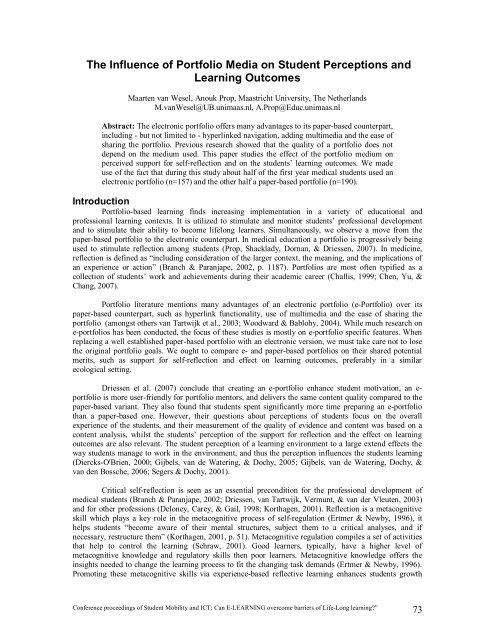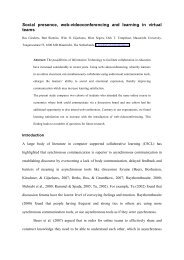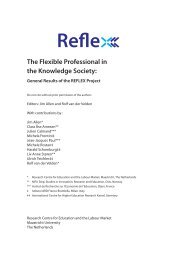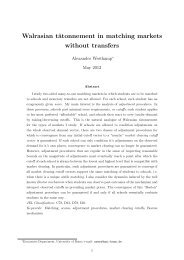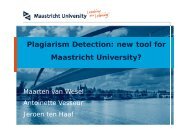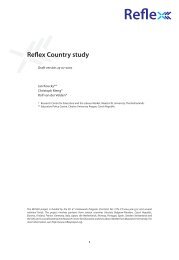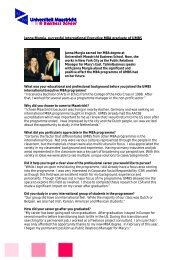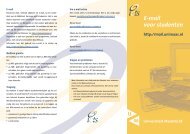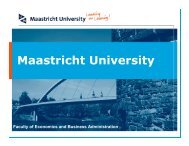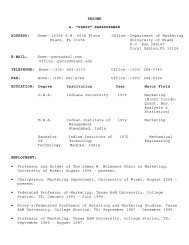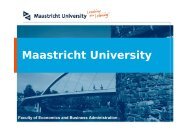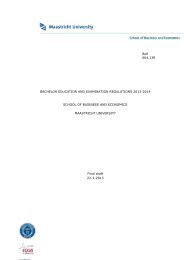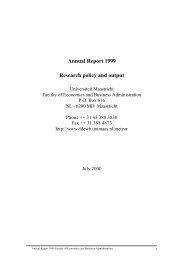proceedings of Student Mobility and ICT: Can E-LEARNING
proceedings of Student Mobility and ICT: Can E-LEARNING
proceedings of Student Mobility and ICT: Can E-LEARNING
Create successful ePaper yourself
Turn your PDF publications into a flip-book with our unique Google optimized e-Paper software.
The Influence <strong>of</strong> Portfolio Media on <strong>Student</strong> Perceptions <strong>and</strong><br />
Learning Outcomes<br />
Maarten van Wesel, Anouk Prop, Maastricht University, The Netherl<strong>and</strong>s<br />
M.vanWesel@UB.unimaas.nl, A.Prop@Educ.unimaas.nl<br />
Abstract: The electronic portfolio <strong>of</strong>fers many advantages to its paper-based counterpart,<br />
including - but not limited to - hyperlinked navigation, adding multimedia <strong>and</strong> the ease <strong>of</strong><br />
sharing the portfolio. Previous research showed that the quality <strong>of</strong> a portfolio does not<br />
depend on the medium used. This paper studies the effect <strong>of</strong> the portfolio medium on<br />
perceived support for self-reflection <strong>and</strong> on the students’ learning outcomes. We made<br />
use <strong>of</strong> the fact that during this study about half <strong>of</strong> the first year medical students used an<br />
electronic portfolio (n=157) <strong>and</strong> the other half a paper-based portfolio (n=190).<br />
Introduction<br />
Portfolio-based learning finds increasing implementation in a variety <strong>of</strong> educational <strong>and</strong><br />
pr<strong>of</strong>essional learning contexts. It is utilized to stimulate <strong>and</strong> monitor students’ pr<strong>of</strong>essional development<br />
<strong>and</strong> to stimulate their ability to become lifelong learners. Simultaneously, we observe a move from the<br />
paper-based portfolio to the electronic counterpart. In medical education a portfolio is progressively being<br />
used to stimulate reflection among students (Prop, Shacklady, Dornan, & Driessen, 2007). In medicine,<br />
reflection is defined as “including consideration <strong>of</strong> the larger context, the meaning, <strong>and</strong> the implications <strong>of</strong><br />
an experience or action” (Branch & Paranjape, 2002, p. 1187). Portfolios are most <strong>of</strong>ten typified as a<br />
collection <strong>of</strong> students’ work <strong>and</strong> achievements during their academic career (Challis, 1999; Chen, Yu, &<br />
Chang, 2007).<br />
Portfolio literature mentions many advantages <strong>of</strong> an electronic portfolio (e-Portfolio) over its<br />
paper-based counterpart, such as hyperlink functionality, use <strong>of</strong> multimedia <strong>and</strong> the ease <strong>of</strong> sharing the<br />
portfolio (amongst others van Tartwijk et al., 2003; Woodward & Bablohy, 2004). While much research on<br />
e-portfolios has been conducted, the focus <strong>of</strong> these studies is mostly on e-portfolio specific features. When<br />
replacing a well established paper-based portfolio with an electronic version, we must take care not to lose<br />
the original portfolio goals. We ought to compare e- <strong>and</strong> paper-based portfolios on their shared potential<br />
merits, such as support for self-reflection <strong>and</strong> effect on learning outcomes, preferably in a similar<br />
ecological setting.<br />
Driessen et al. (2007) conclude that creating an e-portfolio enhance student motivation, an eportfolio<br />
is more user-friendly for portfolio mentors, <strong>and</strong> delivers the same content quality compared to the<br />
paper-based variant. They also found that students spent significantly more time preparing an e-portfolio<br />
than a paper-based one. However, their questions about perceptions <strong>of</strong> students focus on the overall<br />
experience <strong>of</strong> the students, <strong>and</strong> their measurement <strong>of</strong> the quality <strong>of</strong> evidence <strong>and</strong> content was based on a<br />
content analysis, whilst the students’ perception <strong>of</strong> the support for reflection <strong>and</strong> the effect on learning<br />
outcomes are also relevant. The student perception <strong>of</strong> a learning environment to a large extend effects the<br />
way students manage to work in the environment, <strong>and</strong> thus the perception influences the students learning<br />
(Diercks-O'Brien, 2000; Gijbels, van de Watering, & Dochy, 2005; Gijbels, van de Watering, Dochy, &<br />
van den Bossche, 2006; Segers & Dochy, 2001).<br />
Critical self-reflection is seen as an essential precondition for the pr<strong>of</strong>essional development <strong>of</strong><br />
medical students (Branch & Paranjape, 2002; Driessen, van Tartwijk, Vermunt, & van der Vleuten, 2003)<br />
<strong>and</strong> for other pr<strong>of</strong>essions (Deloney, Carey, & Gail, 1998; Korthagen, 2001). Reflection is a metacognitive<br />
skill which plays a key role in the metacognitive process <strong>of</strong> self-regulation (Ertmer & Newby, 1996), it<br />
helps students “become aware <strong>of</strong> their mental structures, subject them to a critical analyses, <strong>and</strong> if<br />
necessary, restructure them” (Korthagen, 2001, p. 51). Metacognitive regulation compiles a set <strong>of</strong> activities<br />
that help to control the learning (Schraw, 2001). Good learners, typically, have a higher level <strong>of</strong><br />
metacognitive knowledge <strong>and</strong> regulatory skills then poor learners. Metacognitive knowledge <strong>of</strong>fers the<br />
insights needed to change the learning process to fit the changing task dem<strong>and</strong>s (Ertmer & Newby, 1996).<br />
Promoting these metacognitive skills via experience-based reflective learning enhances students growth<br />
Conference <strong>proceedings</strong> <strong>of</strong> <strong>Student</strong> <strong>Mobility</strong> <strong>and</strong> <strong>ICT</strong>: <strong>Can</strong> E-<strong>LEARNING</strong> overcome barriers <strong>of</strong> Life-Long learning?” 73


